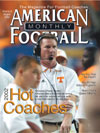AMERICAN FOOTBALL MONTHLY THE #1 RESOURCE FOR FOOTBALL COACHES
|
|
Article Categories
|
Who’s Hot?LSU’s Will Muschamp -- one of the youngest coordinators in college football -- is one of our hot coaches who are ready to prove themselves this season by: Richard Scott© More from this issue DAN HAWKINS, HC, BOISE STATE
After serving as Dirk Koetter's assistant head coach, special teams and tight ends coach and overseeing Boise State’s highly successful community service and public involvement program, Hawkins moved up to the head coach’s job when Koetter took over at Arizona State following the 2000 season.
During his time as an assistant at Boise State, the Broncos went 26-10 and captured two Big West Conference championships and two Humanitarian Bowl victories. When Hawkins took over as head coach, the Broncos went 8-4 and finished third in their first season in the WAC.
Hawkins also has served as both an offensive and de....The full article can only be seen by subscribers.
Subscribe today!

|
|
|
NOT A SUBSCRIBER?
Subscribe
now to start receiving our monthly magazine PLUS get INSTANT
unlimited access to over 4000 pages of 100 percent football coaching
information, ONLY available at AmericanFootballMonthly.com!
|
|
|
HOME
|
MAGAZINE
|
SUBSCRIBE
|
ONLINE COLUMNISTS
|
COACHING VIDEOS
|
Copyright 2026, AmericanFootballMonthly.com
All Rights Reserved






